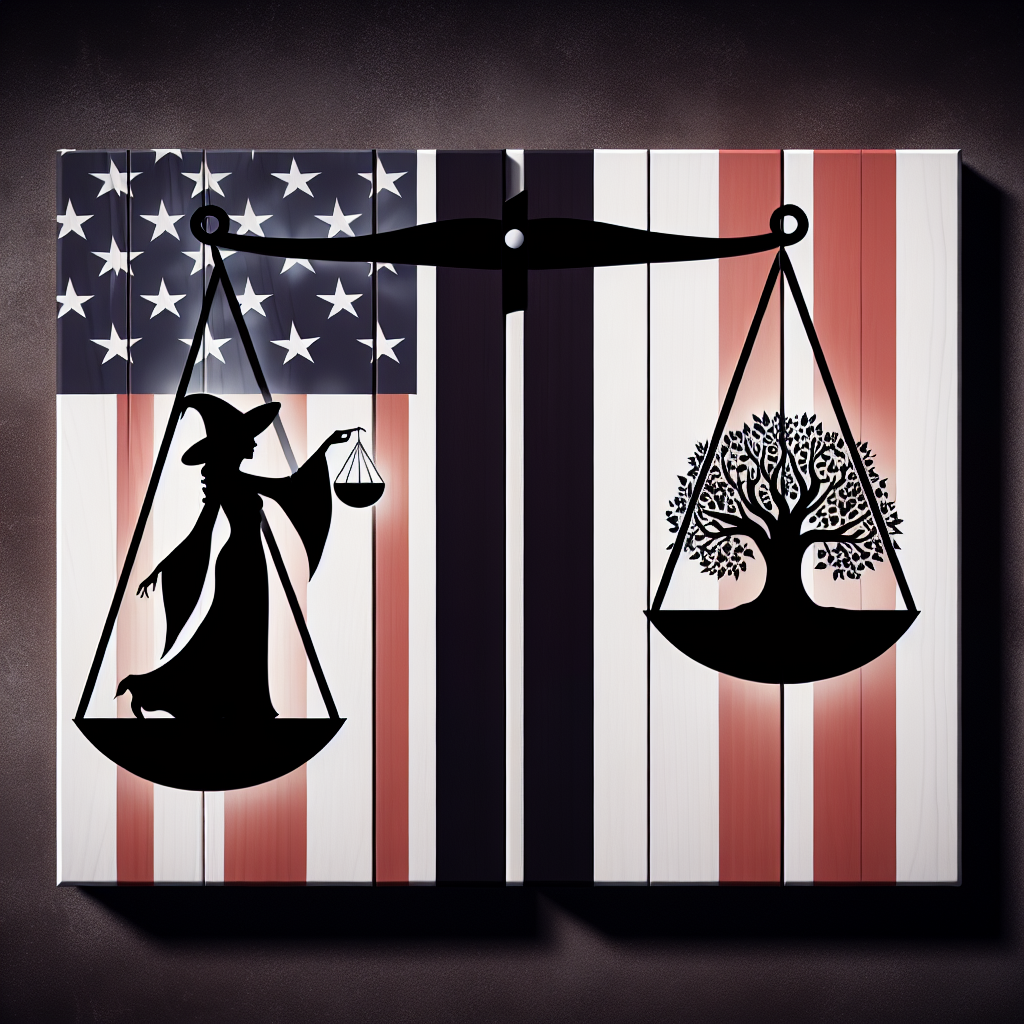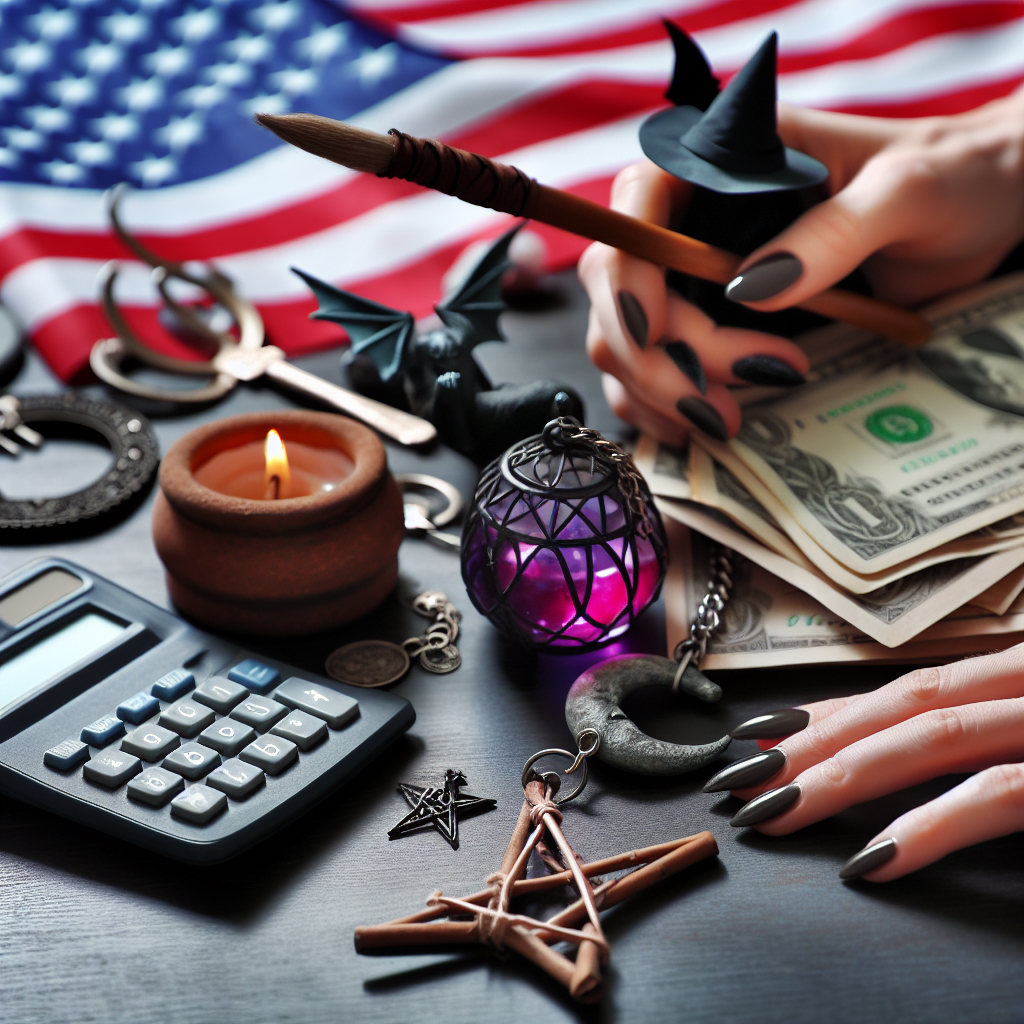As an Amazon Associate I earn from qualifying purchases.
Witchcraft, once a term that incited fear and violent accusations, is now a complex and expansive term covering a range of spiritual practices, often associated with Paganism, Wicca, and other religious movements. Throughout history, particularly in the 17th-century colonial America, witchcraft was a serious crime, resulting in the infamous Salem witch trials where superstition and paranoia led to the execution of 20 individuals. The legal view of witchcraft in the United States has dramatically changed since those dark days of the early colonies.
In the late 17th century, colonial law drew heavily from British common law, which held witchcraft as a punishable offense, often by death. As the centuries progressed, the development of the American legal system began to reflect a society built on the principles of religious freedom and rational thought. Such transformation was greatly influenced by the Age of Enlightenment and the writing of the U.S. Constitution, which brought a new era of legal standards and protections.
The establishment of the First Amendment to the United States Constitution marked a pivotal moment in providing protections for religious freedom, directly impacting the legal standing of witchcraft. This crucial amendment, ratified in 1791, prohibits Congress from making any law “respecting an establishment of religion, or prohibiting the free exercise thereof.” As a result, individuals practicing witchcraft or any religion are afforded protection under the Constitution, making it illegal for the government to discriminate against them on the basis of their beliefs.
A significant step in the recognition of witchcraft as a protected religious practice occurred in the 1980s with the case of Dettmer v. Landon. The court ruled that Wicca, a religion that encompasses modern witchcraft, was entitled to First Amendment protection, reaffirming the legality of witchcraft within the context of practicing a religion. This judicial decision was a landmark as it underscored the nation’s commitment to religious plurality and the legal status of less mainstream faiths.
Despite the legal protections in place, studies and surveys have shown that discrimination and misunderstandings about witchcraft and related religions remain an issue in contemporary society. According to the Pew Research Center, approximately 0.4% of Americans identify as Pagan or Wiccan. This minority, while legally protected, still faces societal challenges due to the stigma that surrounds their beliefs, with some individuals hesitant to disclose their practices for fear of discrimination.
In light of these continued challenges facing practitioners of witchcraft, various advocacy groups and interfaith networks have emerged to educate the public and promote tolerance for all religions. These efforts are crucial in preserving the hard-fought legal status of witchcraft in the United States and ensuring that the dark specter of persecution does not re-emerge in modern times. With ongoing advocacy and education, the hope is to cultivate a diverse society that not only understands the legal rights associated with witchcraft but respects the freedom to practice it openly without fear.
“`html
Is Practicing Witchcraft a Crime in America? Unveiling the Legal Stance
“`
Witchcraft, as a practice associated with the exercise of supernatural or magical powers, holds a controversial place in legal history. However, in the contemporary United States, witchcraft itself is not a criminal offense. The First Amendment of the U.S. Constitution guarantees freedom of religion, which encompasses a wide array of spiritual and esoteric practices, including those labeled as witchcraft. Therefore, individuals in the USA are free to engage in witchcraft or any other spiritual traditions, provided they do not infringe upon the rights of others or break the law in the process. This protection paves the way for a diverse tapestry of beliefs and practices coexisting within the legal framework. Continue reading to delve deeper into the intricate relationship between witchcraft, religious freedom, and the American legal system.
Witchcraft, as a practice and belief system, has a complicated history in the United States. In the colonial period, notably in Salem, Massachusetts, during the infamous Salem Witch Trials of the 17th century, witchcraft was indeed punishable by law. More than 200 individuals were accused of practicing witchcraft, and 20 were executed. However, today, the legal situation regarding witchcraft is substantially different.
In contemporary America, witchcraft itself is not illegal. The United States Constitution guarantees religious freedom, which is codified in the First Amendment, stating that “Congress shall make no law respecting an establishment of religion, or prohibiting the free exercise thereof.” This applies to all religions and spiritual practices including Wicca, Paganism, and other paths that may typically be associated with witchcraft. As such, individuals are free to practice witchcraft or any other religion, for that matter, so long as their practices do not infringe upon the rights of others or break any laws.
Legal Protections for Witchcraft and Similar Beliefs
The legal system in the United States has reinforced the right to practice witchcraft under the umbrella of religious freedom multiple times. Cases such as Dettmer v. Landon in 1986 have underscored that Wiccan inmates have the same rights as those practicing more mainstream religions. They are entitled to protection under the Religious Land Use and Institutionalized Persons Act (RLUIPA) and the Religious Freedom Restoration Act (RFRA), which guard against undue governmental burdens on the exercise of religion.
Limitations and Considerations
While witchcraft in and of itself is legal, any illegal activities sometimes associated with the practice of witchcraft or any other spiritual practices are, of course, still prohibited. This can include trespassing on private property, theft of items (such as plants or artifacts used in ritual), animal cruelty, or practicing medicine without a license under the guise of “healing.” These actions are prosecuted under the relevant areas of law regardless of their purported spiritual motivations.
Furthermore, while the practice of witchcraft is protected, not everyone may be aware of these protections, and practitioners sometimes face discrimination or local backlash, despite the illegality of such discrimination. Various laws are in place to protect individuals, including practitioners of witchcraft, from discrimination in housing, employment, and other areas of life. The Equal Employment Opportunity Commission (EEOC) clearly states that employers must accommodate any bona fide religious beliefs insofar as they do not cause undue hardship to the business.
Education and Outreach
Various organizations and advocacy groups continue to educate law enforcement, government entities, and the public about the rights of individuals who practice witchcraft and other non-mainstream religions. Outreach efforts also aim to dispel myths and misconceptions surrounding these spiritual paths to foster greater understanding and reduce prejudice.
Incidence of Witchcraft Practices
Despite the sensationalism that sometimes surrounds witchcraft in the media, those who identify with Wicca or related spiritual paths make up a small but growing number of the religious landscape in the United States. According to the Pew Research Center’s religious landscape study, less than 1% of Americans identify as Pagan or Wiccan. However, the practice of witchcraft, more broadly defined, may be more widespread as it can encompass a variety of practices and beliefs not captured in such surveys.
In summary, the question of “Is witchcraft illegal in the USA?” is met with a clear no, so long as the practice respects the law and the rights of others.embre of the American religious tapestry, protected under the same constitutional freedoms as any other religious practice.
1. Is the practice of witchcraft currently illegal anywhere in the United States?
No, the practice of witchcraft itself is not illegal in any state within the United States, as it is protected under the First Amendment, which guarantees freedom of religion and expression.
2. Were there any historical laws in the United States that made witchcraft illegal?
Yes, historically, during colonial times, there were laws that made witchcraft illegal, which resulted in the infamous Salem Witch Trials. However, such laws have long been abolished and are not enforceable today.
3. Can an individual face legal repercussions for identifying as a witch in the USA?
No, an individual cannot face legal repercussions simply for identifying as a witch. Religious freedom is a constitutional right in the USA, and this includes a wide array of belief systems, including those that may be considered witchcraft or Wicca.
4. Are there laws that protect practitioners of witchcraft from discrimination?
Yes, there are laws that protect individuals, including those who practice witchcraft, from religious discrimination. This includes protections under the Civil Rights Act of 1964, which prohibits discrimination based on religion in various settings such as employment and public services.
5. Can rituals or spells be considered illegal in the USA?
Rituals or spells themselves are not illegal as long as they don’t involve activities that are separately illegal, such as trespassing, theft, animal cruelty, or harming others. The content of a ritual or spell is protected under religious freedom, but actions taken during such practices must adhere to the law.
6. Are there any specific laws regarding the sale of witchcraft-related items?
There are no federal laws specifically regulating the sale of items labeled as “witchcraft-related,” such as crystals, herbs, or tarot cards. However, business practices, in general, are subject to consumer protection laws and regulations that prohibit fraudulent claims.
7. What should a practitioner of witchcraft do if they feel they have been discriminated against?
If a practitioner of witchcraft believes they have been the victim of discrimination, they may file a complaint with the Equal Employment Opportunity Commission (EEOC) or seek legal counsel to explore their rights and potential for a civil lawsuit.
8. Are there any states that have specific protections for witchcraft practitioners?
While no states have specific laws that single out witchcraft practitioners for protection, many states have laws that broadly protect religious beliefs and practices, which include those of witchcraft practitioners.
9. Is it legal to teach witchcraft or hold public witchcraft-related events in the USA?
Yes, it is legal to teach about witchcraft and to hold public events related to witchcraft, as these practices are encompassed by freedoms of religion, speech, and assembly. It’s important that these events comply with any applicable local regulations, such as permits for gatherings.
10. Can parents legally teach witchcraft to their children in the USA?
Yes, parents in the USA have the right to pass on their religious beliefs and practices, including witchcraft, to their children. This is part of the constitutional right to religious freedom, as long as the teachings and practices do not harm the child’s welfare.

Conclusion
Throughout the United States, the law does not consider witchcraft itself a criminal offense. The country’s foundation on principles of religious freedom ensures that individuals may practice witchcraft or any other religion without fear of legal repercussions, as long as their practices do not infringe on the rights of others or break any other secular laws. The First Amendment to the U.S. Constitution grants all citizens the right to freely practice their religion, and witchcraft falls under this protective umbrella. The eradication of archaic laws against witchery, dating back to the infamous Salem witch trials, emphasizes America’s progress towards religious tolerance and personal liberty.
However, activities commonly associated with witchcraft may sometimes fall afoul of the law if they involve fraudulent activity, harm to others, animal cruelty, or the use of illegal substances. As with any practice, it is the responsibility of individuals to ensure that their actions within the realm of witchcraft are ethical and lawful. It is pivotal for contemporary witches and practitioners of pagan traditions to understand the specific legislation in their jurisdiction to avoid legal complications. In essence, witchcraft as a practice remains legal in the United States, but it must be conducted within the bounds of the law that governs all citizens, regardless of their spiritual or religious beliefs.
Amazon and the Amazon logo are trademarks of Amazon.com, Inc, or its affiliates.


